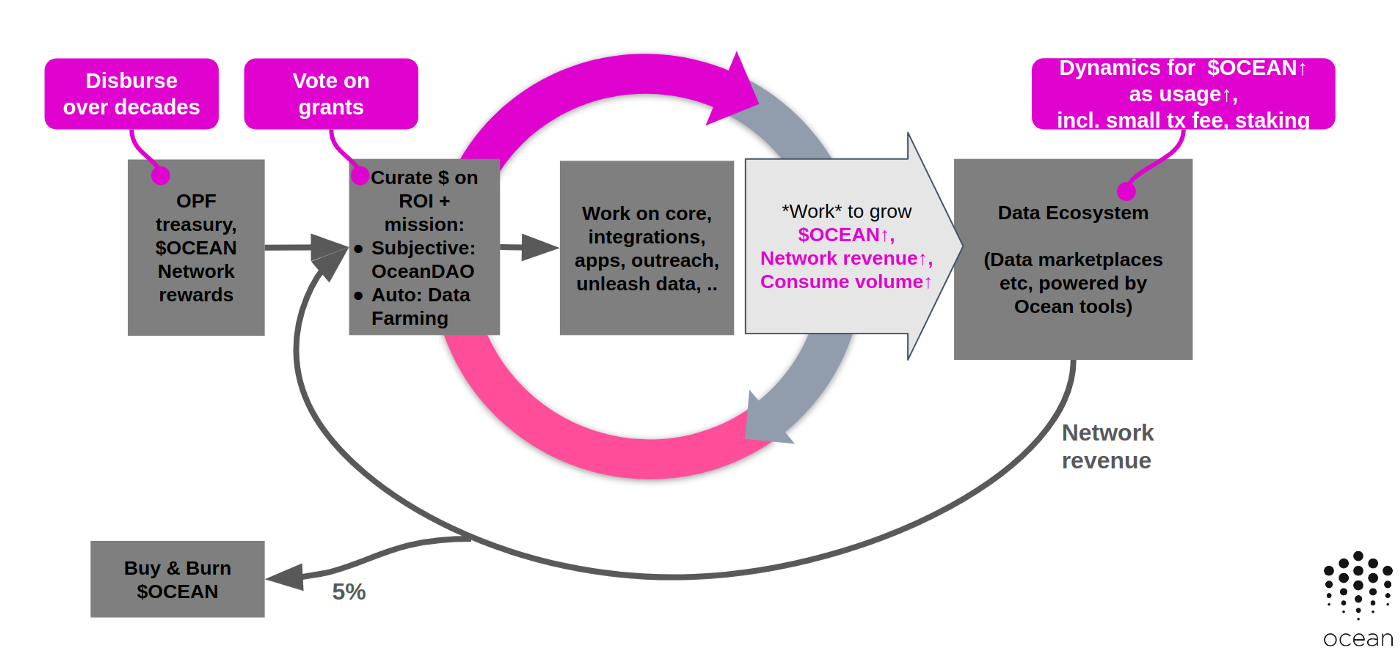有關加密經濟系統的分析和設計研究一定是跨學科的。

區塊鏈網絡和類似的加密經濟網絡是系統,特別是複雜的系統。它們是具有多尺度時空動態的自適應的網絡。為實現共同目標而采取的個人行動,會受到“目標驅動” Token 的激勵。例如,含有經濟機制的區塊鏈網絡,允許分布式網絡同時維護通用狀態層,支持對等結算,並激勵集體行動。這類網絡代表了促進社會經濟合作的制度基礎,在沒有中介或傳統組織的情況下。在不受信任的環境中,該網絡也為自治主體(Agent)提供了任務關鍵型和安全關鍵型的監管基礎結構。而網絡 Token 提供的豐富、實時的數據,反映了系統中的所有經濟活動。因此,我們可以利用網絡科學和數據科學的進步,以與現代系統工程的最佳實踐一致的方式,來設計和分析加密經濟系統。該研究主要需要:(i)複雜系統方法論,(ii)跨學科研究,以及(iii)經濟學與工程方法的組合。因此在這裏被稱為 “經濟系統工程”,可以用於監管和控制這些社會經濟系統。本文提供了一個綜合研究空間的概念框架,並繼續概述該領域未來研究的具體研究問題和方法,應用基於跨學科文獻回顧和所引用作品的相關背景化的歸納方法。
【論文題目】Foundations of Cryptoeconomic Systems
【作者】Shermin Voshmgir, Michael Zargham
【譯者】Sissi, TELab
Part.1 引言(節選)
加密經濟學是加密保護的對等網絡中經濟協調博弈的新興領域。加密經濟網絡的微觀經濟研究是最常使用的視角,它恰好屬於經濟學和計算機科學的機制設計的重疊部分。但計算機科學的一個弱點是傾向於“技術中立”,低估了創造者對結果應付的責任。這與系統工程文獻截然相反,後者將重大責任歸於負責設計和維護關鍵基礎設施的工程師身上。從更廣闊而全面的視角來看,加密經濟網絡使得新型的制度基礎得以顯現,伴隨著法律創新,可能繼續促進我們的社會經濟制度發生緩慢但持久的變革。
Part.2 複雜系統視角(節選)
類似於加密經濟系統這樣的複雜系統,與其他系統的不同之處在於,不能簡單地從單個網絡中由行為誘發的局部狀態變化中,推斷出系統級行為。如果忽略此困難,所建的模型將毫無用處。
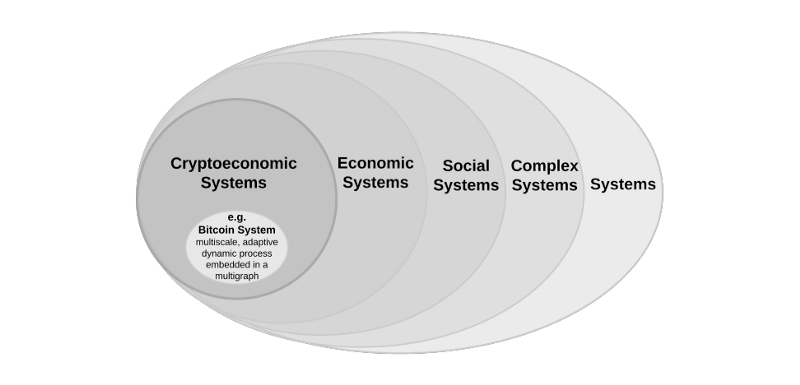
系統理論可以提供工具,用於分析加密經濟系統部件之間的關系和依賴性如何決定全系統的屬性。該工具可以發現經濟網絡的系統動態、約束、條件和原則,以便理解、建模和引導系統。
Part.3 跨學科研究視角(節選)
跨學科的研究過程通常是啟發式的、迭代式的和反思式的,並在適當的情況下借鑒特定學科的方法。它深深紮根於各學科,但提供了對知識創造的學科方式的修正,通過學科融合跨越了單一學科知識。雖然學科被認為是基礎的,但它們也被認為不足以解決複雜問題,犧牲了全面性,忽視了學科邊界之外的重要研究問題。鑒於區塊鏈網絡和類似的加密經濟系統為社會經濟活動提供了治理基礎設施,因此需要單學科和跨學科研究的共生,以達到與複雜系統相關的必需的廣度與深度。
關於加密經濟系統,我們已經確定了以下相關學科:工業與系統工程,人工智能,優化與控制理論,計算機科學與密碼學,經濟學與博弈論,心理學與決策科學,政治學,制度經濟學與治理,哲學,法律與倫理學,以及運籌學與管理學。如果單從某一學科的角度入手,得出的結論一定是片面,但這些學科實際上受到一個核心概念的約束:資源分配。特別是,加密經濟網絡為具有獨特偏好、信息和能力的利益相關者的資源配置決策提供了協調和縮放。分配決策包括:(i)物理資源,如硬件和電力;(ii)金融資源,如 Token 或法定貨幣;(iii)社會資源,如註意力,參與治理、代碼貢獻或布道。
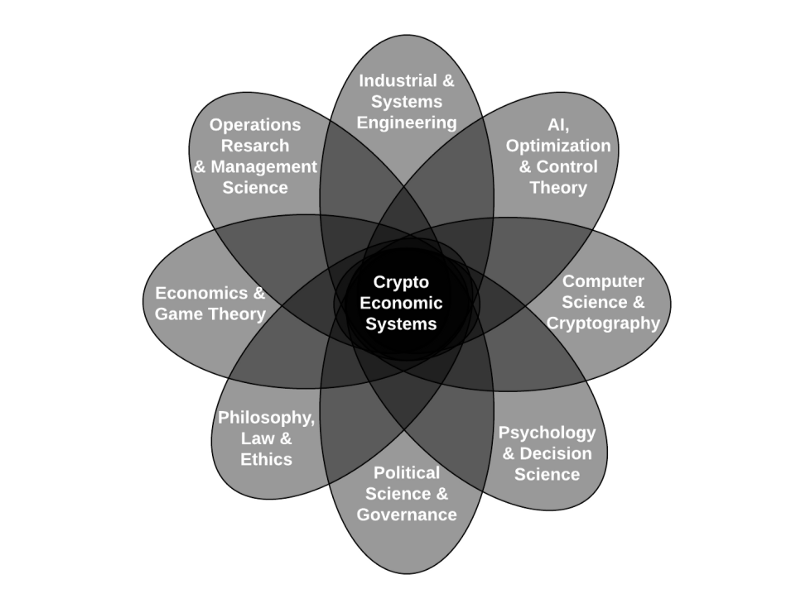
Part.4 制度經濟學視角(節選)
制度經濟學是經濟學的一門分支,與政治經濟學、社會學、歷史學、管理科學和控制論相交。它研究正式或非正式、公共或民間制度的作用,一套規則、規範、程序、慣例、約定、傳統或習俗來所代表的制度,來引導社會經濟互動。
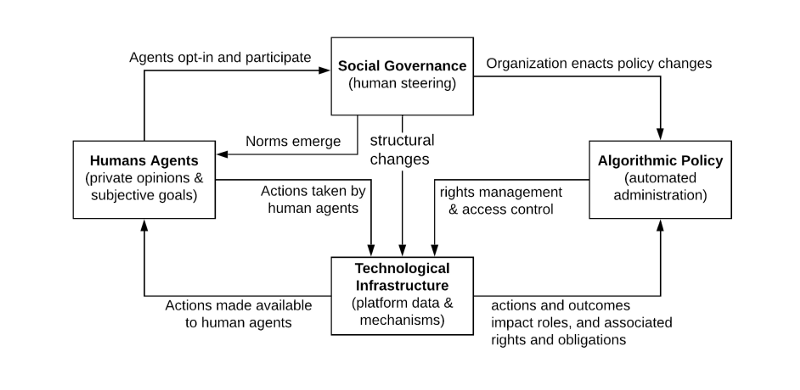
加密經濟網絡使更多流動的組織能夠通過互聯網正式化 — — 圍繞特定的經濟、政治或社會目的 — — 通常被加密社區稱為“去中心化自治組織”或“DAO”。
作為制度性基礎設施,加密經濟網絡更像民族國家,而不是公司。他們的協議類似於一個民族國家的憲法和管理法律,結合了正式(鏈上)和非正式(鏈下)規則集。
加密經濟網絡提供了一種基礎設施,可以改變現有制度的構成和動力,因為使用這種設施可以(i)減少組織的委托-代理困境,提供更高的透明度,(ii)減少官僚機構“去中介化”,以及(iii)用積極自動的機制取代當前法律制度下的被動程序保障,使潛在違約代價變得高昂而不可行。
Part.5 合作演化視角(節選)
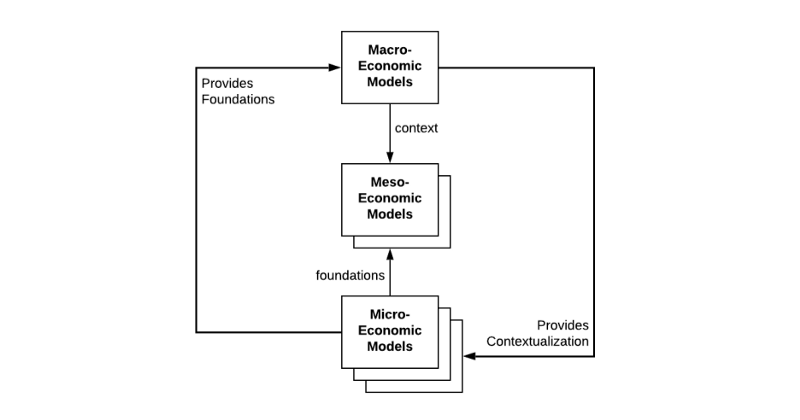
實際上可能的是,加密經濟系統是多種策略的混合,在最近關於合作演化的研究中也被稱為“規範”。持續的研究提出了關於間接互惠、元激勵等概念的更多見解,這與加密經濟學的研究直接相關,它被視為設計激勵措施的手段,這類激勵使得協調規範可以抵禦加密經濟網絡中自私入侵。
在“協調理論”的演變中,基於某些策略的對於主體如何做出個體決策的研究,應用了計算和實證的方法,強調了非明顯系統屬性的產生以及這些屬性如何誘發未來行為的變化。
Part.6 多尺度視角(節選)
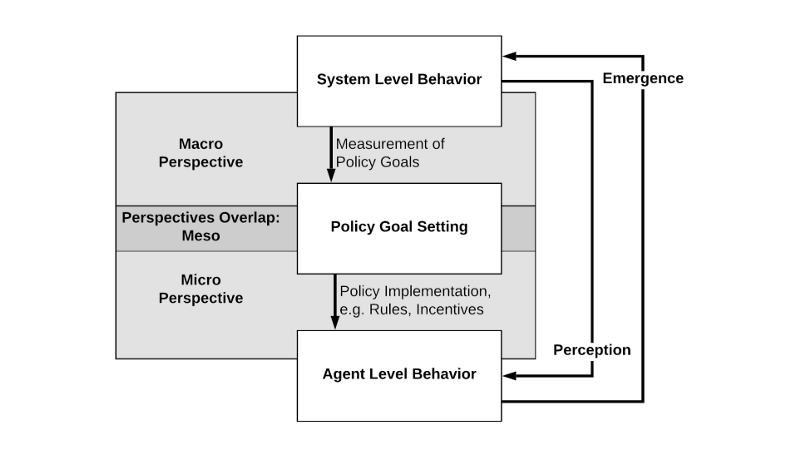
任何模型都需要對其構成部分的屬性以及嵌入模型的環境或更大的系統進行假設。從經濟學的角度來看,更大系統的模型提供了宏觀經濟背景,而組成部分的模型提供了微觀經濟基礎。將多尺度視角應用於經濟系統並不是一個新想法。
通過多尺度視角,可以研究諸如湧現等尺間現象。在比特幣網絡中,主體(礦工)間的工作量證明博弈與網絡本身發生的相互作用,是多尺度反饋的例子之一。通過引入反饋回路來更正難度並保持十分鐘的出塊時間,系統本身就成為了博弈的一部分。加密經濟系統中動態多尺度的另一個例子是聯合曲線,包含 Bancor 和 Uniswap 這樣的流動性池。聯合曲線的詳細分析表明它們編碼了非平凡的位形空間,在空間中,個別主體的簡單行為可以集體誘發全局狀態的湧現變化。
比特幣網絡和聯合曲線示例顯示了多尺度模型與加密經濟系統的相關性,因為無論是這些系統中實體之間的微觀博弈,還是宏觀屬性的觀察,都不足以表征系統動態。
Part.7 網絡科學視角(節選)
加密經濟系統是一種複雜系統,它可以由共同構成網絡的交互組件來表示。通俗地講,網絡是互連的人或事物組成的集合或系統。
網絡科學是指應用圖論和網絡動力系統來研究社會經濟網絡,因此在分析和建模加密經濟系統的背景下是相關的。
加密經濟網絡由三個相互連接的網絡組成:(i)計算和通信網絡:由節點組成,這些節點利用對等協議通過挖掘新塊來驗證交易;(ii)金融網絡:由比特幣地址組成的金融網絡,可以簽署交易和轉移資金;以及(iii)鏈下社會經濟網絡代表的個人和組織,控制著金融網絡中的 Token,並在計算和通信網絡中運營這些節點。
Part.8 Token 作為系統狀態(節選)
由於 Token 代表任何加密經濟系統狀態的一部分,可以被看作是系統的原子單元。“狀態”一詞是指由網絡中所有節點集體管理的一組唯一數據(分類賬)。Token 是經濟系統個體化狀態的代表,包含更改系統狀態的特定權利。
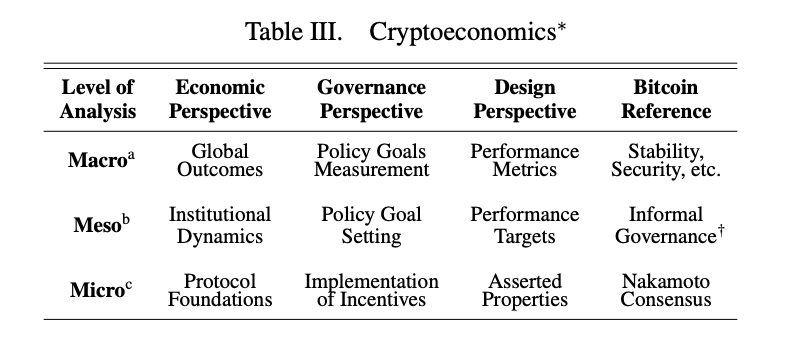
加密經濟學涉及三個交互層或分析層次,定義了微觀基礎、中觀制度和宏觀可觀察領域的特征。
- 宏觀可觀察量是系統的全局屬性,為中觀制度層的決策提供信息,並提供利益相關者可以影響微觀基礎屬性的反饋、性能指標和對策。
- 中觀制度特征包括基於並需要微觀基礎的決策和目標確定。經濟學中的機制設計為機構、組織和團隊提供信息。
- 微觀基礎特性是計算機科學中所使用的在機制設計中具有自然表達式的假設規範。
Part.9 統一視角下加密經濟學(節選)
加密經濟系統被定義為複雜社會經濟網絡:(i)個體自治行為者,(ii)嵌入在協議或智能合約中的經濟策略,以及(iii)按照協議或智能合約的規則,由行為者與整個網絡交互所產生的湧現屬性。因此,加密經濟學的全面定義包括三個層次的分析:(i)微觀基礎,與主體行為相關;(ii)中觀制度,與政策制定和治理相關;(iii)宏觀可觀察量,涉及系統指標的衡量和分析。至關重要的是,每個分析級別的動態都是相互依存的,不能簡單地歸結為單層 — — 治理正是管理微觀和宏觀之間關系的。
Part.10 加密經濟學研究方向(節選)
加密經濟系統提供了促進廣泛的社會經濟互動的制度基礎。由於對等協議支持通過 Token 進行的狀態依賴,制度基礎的設計空間包含了創新的社會經濟互動模式。有關加密經濟系統的分析和設計研究一定是跨學科的。在跨學科研究的基礎上,未來的研究工作包括 — — 但不限於以下主題:(i)“目標驅動” Token,(ii)數據驅動型經濟,(iii)不完全契約,(iv)作為社會基礎結構的決策算法倫理學,(v)將計算社會科學應用於加密經濟系統,以及(vi)將信息物理系統工程應用於加密經濟設計和分析。
[Abstract] Blockchain networks and similar cryptoeconomic networks are systems, specifically complex systems. They are adaptive networks with multi-scale spatio-temporal dynamics. Individual actions may be incentivized towards a collective goal with “purpose-driven” tokens. Blockchain networks, for example, are equipped cryptoeconomic mechanisms that allow the decentralized network to simultaneously maintain a universal state layer, support peer-to-peer settlement, and incentivize collective action. These networks represent an institutional infrastructure upon which socioeconomic collaboration is facilitated — in the absence of intermediaries or traditional organizations. They provide a mission-critical and safety-critical regulatory infrastructure for autonomous agents in untrusted economic networks.Their tokens provide a rich, real-time data set reflecting all economic activities in their systems. Advances in network science and data science can thus be leveraged to design and analyze these economic systems in a manner consistent with the best practices of modern systems engineering. Research that reflects all aspects of these socioeconomic networks needs (i) a complex systems approach, (ii) interdisciplinary research, and (iii) a combination of economic and engineering methods, here referred to as “economic systems engineering,” for the regulation and control of these socioeconomic systems. This manuscript provides a conceptual framework synthesizing the research space and proceeds to outline specific research questions and methodologies for future research in this field, applying an inductive approach based on interdisciplinary literature review and relative contextualization of the works cited.
TELab: 本文內容僅供學習研究參考,並不構成任何廣告銷售或投資建議。投資者據此操
作,風險自擔。轉載/內容合作/尋求報道,請聯系 TELab 授權並註明出處。

